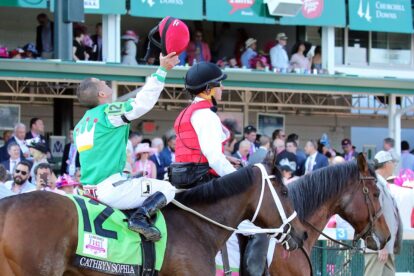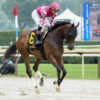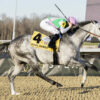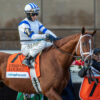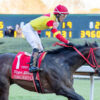Owner & Trainer
JOHN ASHER: All right. This is a wonderful, wonderful, moment. We have a lot of wonderful moments every year at Churchill Downs. But, when we get to celebrate the victory at the Kentucky Oaks and the Kentucky Derby, it’s very, very special. It’s marvelous.
We don’t have everybody here. Jockey Javier Castellano is riding in this race. We should all, obviously, run and place a bet on that horse before we get started here. We are thrilled to have the winning connections for Cathryn Sophia, winner of the 142nd Longines Kentucky Oaks.
Cash Is King, L.L.C., is the owner. Chuck Zacney is the head of that operation.
John Servis, whom we know here from this racetrack from a wonderful day back in 2004 when Smarty Jones won the Kentucky Derby for John Servis. And I asked John if he knew his record at Churchill Downs was pretty good. He’s now 2‑4 lifetime at Churchill Downs. One win in the Kentucky Derby and one horse in the Kentucky Oaks. John said he’s not going to bring another horse with him ever again. Now that he has a perfect record.
Much to my delight, we discovered that Cathryn Sophia McCarry. But it is Cathryn Sophia? So you can make a connection here, ladies and gentlemen. The namesake of the Kentucky Oaks winner, Cathryn Sophia, is here. And we’re thrilled to have them here. Congratulations to all.
CHUCK ZACNEY: Thank you.
JOHN ASHER: John, I think she can go a mile and an eighth. You had questions about distance with her but did not show ‑‑ that was not an issue today.
JOHN SERVIS: No. She’s matured so much mentally. And she’s learned to set on me. Down the backside she was just galloping along, so relaxed that I felt pretty good. I don’t want to feel too good early on in the race, but I felt pretty good where we were.
JOHN ASHER: She was unbeaten until she went to the Ashland. Last fall, when she ran in Maryland, she won openly. 14 of 16 I think was the margin. Knew you had a talented filly. We were disappointed in Keeneland. In retrospect, looking back at that race, looking at this race and somehow she ran today, was it a matter of tactics or just her maturing and coming along?
JOHN SERVIS: I think it is a little bit of both. It turns out the best thing that ever happened to her was the day at Gulfstream when she got left at the gate. And we realized how well she settled in behind horses. With Songbird, as talented as she is, it can looks like, if you want to beat her, you have to hook her early. If she would have run, I don’t know. Because, if we do that, then you’re changing her style. And now you’re messing with her head. She’s maturing. She’s learning to settle. Now you will put her out on the pace to try to soften up another horse. So with Songbird being out and her coming into this race as good as she was and how she learned to settle, we were feeling pretty good.
JOHN ASHER: We’ll wish the best for Songbird down the road.
JOHN SERVIS: Absolutely. Absolutely.
JOHN ASHER: In your case, it is really good when things work out.
JOHN SERVIS: Yes, it is.
JOHN ASHER: 2‑2 in the classics here at Churchill Downs, Kentucky Derby. I’ll give you a chance to think about before I ask you these two bookends compare. And we will go to Mr. Zacney and say congratulations on a wonderful filly.
Were you prepared for this kind of effort today from Cathryn Sophia?
CHUCK ZACNEY: I really was. I talked to John pretty much every day since the Ashland. He was just so confident in his filly. I was cautiously optimistic. Every time I talked to him, his confidence was just bubbling over. I think it happened probably about two weeks ago. She did about 11/12 for six furlongs. And he was just thrilled to death. We felt pretty good going into this race. Obviously, an extra 16th was a concern after the Ashland.
But the way she was training and all, we felt pretty good.
JOHN ASHER: It was a good race. We’re obviously proud of it. Where does it rank for you? Is this a very good moment in thoroughbred raising for you?
CHUCK ZACNEY: Absolutely. I had the pleasure of being part of the ownership of Afleet Alex back in 2004, 2005. He won 2/3 of the Triple Crown. As far as fillies, this is very, very special for many reasons.
I was looking for a Maryland‑bred horse in 2014. Went to the Fasig‑Tipton sale and picked her out. She wasn’t a big filly, but she was athletic. And we got her for $30,000. And what a bargain today.
JOHN ASHER: Exactly. Nice return on investment.
CHUCK ZACNEY: Yes, it is.
JOHN ASHER: Million dollars overall purse today.
Cathryn Sophia, we’ll turn to you. Did you know this horse was going to be named after you? What are your thoughts today with a horse winning a race of this caliber? And your name will be pretty prominently placed around our racetrack for a good while. Is it a thrill?
CATHRYN SOPHIA McCARRY: It’s a thrill. It’s a privilege, too, to be here, to be named after the horse that just won. It’s an amazing feeling.
JOHN ASHER: Are you a fan of horse racing, or are you much more of a fan of horse racing today than you were yesterday? Where are you in terms of your regard for the sport?
CATHRYN SOPHIA McCARRY: Yeah, I am now.
CHUCK ZACNEY: This is actually the first race she’s been to.
JOHN ASHER: I had a feeling.
CHUCK ZACNEY: Being in college and all that, it’s pretty difficult.
JOHN ASHER: Where do you go?
CATHRYN SOPHIA McCARRY: Rowan University.
JOHN ASHER: Your thoughts on winning this race? You have been here with Afleet Alex running a huge race.
CHUCK ZACNEY: Yeah, this was terrific. She ran a great race. John had her prepared, and Javier gave a great ride. The results were there. I think we won about by three lengths. We are thrilled to that. Prior to coming up to the name for the horse, I always talk to the trainer. “John, what do you think?” He said, “She’s got some talent.” I said, “Good. Because I want to name her after my niece.” She’s a little spitfire, soccer player. She certainly demonstrated that today.
JOHN ASHER: It’s been my experience in racing, if you name a horse after a human, they are either slow or really healthy and pace well for a long time. This one breaks the rules.
John, your thoughts on where this filly has come from? Does this performance surprise you?
JOHN SERVIS: No, no. I mean, from her first race, we knew she had a lot of talent. Again, obviously, you know, how far she would go was always in question. And the maturity that she has shown in the last three, four weeks alone, she just made the turn for the better. And she’s been terrific.
JOHN ASHER: You really should come here more often. You have one for each spire now.
Q: John, could you elaborate on the calculation with or without Songbird. And, if you had not run here, what would have been the plan?
JOHN SERVIS: Well, you know, I don’t want to make it sound like we ran from Songbird. Because, if she would have won the Ashland, we would have certainly run the Oaks with or without Songbird.
I had a little reservation when she got beat, when she rolled up there at the head of the lane like she did and then didn’t go on. And I had always had a little bit about how far she would go, just because she’s not your typical‑looking two‑turn horse. And Street Boss is most of a sprinter sire and was a sprinter himself. You always have that in the back of your mind.
Q: Where would you have gone?
JOHN SERVIS: Probably to the Eight Belles. If we didn’t go to the Oaks, we were going to ‑‑ we were planning on, if everything went well doing the Eight Belles, and then maybe the Acorn.
Q: What does it say about the game that you can win an Oaks with a $30,000 purchase?
JOHN SERVIS: It says the game is great. This isn’t the first time those kind of things happen. I mean, look at Seattle Slew. There has been a lot of really, really good horses that were bought and passed for different reasons. And, you know, somebody took a shot and bought them. And it turned out really well.
This isn’t the first time, and I’m sure it’s not going to be the last. We are just tickled to death it turned out for us.?
CHUCK ZACNEY: It says everybody has a chance. You look at some of the numbers of the horses in the sales. And a lot of them are over a million dollars. And here we are picking a Maryland‑bred out for 30,000. And we are winning the Kentucky Oaks. That’s pretty impressive.
Q: John, what does it feel like to be back here 11 years or 12 years after Smarty Jones and winning this race?
JOHN SERVIS: It feels terrific. I went into the race today feeling really good. And I could tell you, I mean, if we would have got beat, I would have felt really good. Because I knew my filly was bringing her A game. And I knew she was going to run well. And if we got beat, we got beat. That’s just the way it’s going to be. It’s nice to know that you are going into a race like the Oaks and a race like the Kentucky Derby with a little powder in the gun.
Q: John, I think you said earlier in the week that this filly is a little tougher than others to handle. Can you elaborate?
JOHN SERVIS: Not a little. Not a little. No.
Q: How difficult is it?
JOHN SERVIS: I will give you an example how tough she is. She came back from the racetrack on Thursday. And she went in the stall. We put the cross bar up. My son was in there with the blanket. The exercise boy got off of her, was taking the tack off of her, and the groom was in there with the halter ready to put the halter on her. And I was standing at the end of the barn talking with somebody. And next thing you know I see three bodies fly out of the stall.
I go running down there. I go, “What the heck is going on?” And the groom pulled the bridle off before the exercise ‑‑ the exercise rider is supposed to pull the bridle off. The groom pulled the bridle off. When he did, as soon as he did that, she just wheeled around and bit him right in the stomach and threw him out of the stall. And now she’s loose. He’s got the halter. He’s out in the shed row. And my son and the exercise boy, all they knew they were getting the heck out of there.
Now I have a hot horse in the stall, nothing on. And you are not just going to get into the stall and get her. We got a scoop of feed and messed with her for a little while. And she finally came to the front and was nibbling on the feed, and we got the halter on her and got her out. But she is a handful.
I don’t want to make it sound like she is mental or crazy. She is just mean. She’s not like that really out of the stall. But when you are in her stall, that’s her stall. I get a call at 8:00 at night one night, the
groom ‑‑ we are putting the night sheets on earlier on in April. Can’t catch her to get a night sheet on her. I had to get people over there. She’s run a lot of people out of the stall, I can tell you that.
JOHN ASHER: We should feel fortunate she is not on the track instead of the winner circle.
JOHN SERVIS: Out of the stall, she is pretty good. The great thing is she carries that attitude to the racetrack.
JOHN ASHER: Quick note, attendance at the Kentucky Oaks was a record. 124,583. Beat the record that was set last year 123,763. Your winning time 1 minute 50.53 today for Cathryn Sophia.
Q: John, did the whole Smarty experience help you? I know it’s been 11 years. You once told me that you didn’t have dinner reservations. And after Smarty won, you had takeout pizza in the lobby? Do you have dinner says reservations tonight?
JOHN SERVIS: No. If it wasn’t broke, I wasn’t going to fix it. I did it on purpose. I called a couple places, and they were booked earlier in the week. And I thought it worked pretty good last time. I’m not even going to worry about it.
Q: Chuck, you mentioned you were looking for a Maryland‑bred. Curious why. And what are your plans for her next, and is there a possibility you might take her to Maryland to run again at some point?
CHUCK ZACNEY: I was looking for a Maryland‑bred because I had looked at the program and saw it was improving. That’s one of the reasons I was leaning in that direction. I did most of my racing in Philadelphia Park. I have a number of PA‑breds, but I wanted to expand upon that.
Q: What are your plans for her? Would you consider taking her back to Maryland?
CHUCK ZACNEY: I think we’ll probably discuss it. But maybe five weeks from now, the Acorn at Belmont. I think we’re going to consider that.
Q: Chuck, you mentioned about your association with Afleet Alex. How does this compare to that?
CHUCK ZACNEY: Afleet Alex was really a special horse and a special time. It was a group of owners. And we just had a great ‑‑ it was really our first horse. You know, back in 2004, we went to a sale and paid 75,000 to pick Afleet Alex out. And then to come here was ‑‑ after a couple wins, we
came here. We came in third. So that was a little disappointing. Then we won the Preakness and Belmont.
It is different because we were so new to the game in 2004, 2005. Now I kind of the ups and downs over the last ten years. So this is really special. I have never had a filly like this. I had a couple pretty good fillies, but certainly nothing of this quality.
Q: Have you named your horses after your relatives? Is that a common thing that you’ve done?
CHUCK ZACNEY: I have.
Q: Who are other ones you have? Who are they named after?
CHUCK ZACNEY: Like I said, I usually get some feedback from the trainer. We had some horses actually named after my son. John’s actually trained a horse Awesome Alex, out of Afleet Alex. He ran Tuesday and won at Philly Park.
We had others Prep Proud after my son’s school, which is St. Joe’s Prep. It’s just a matter as I came across names and people. Like I said, I always ask for feedback from the trainers and get a feel as to what direction to go as far as naming.
Q: When did you make the decision to run the Oaks instead of the Eight Belles and why?
JOHN SERVIS: I guess it came down to that work, really. With Songbird being out, Chuck and I talked about it. And we went back and watched the Ashland ‑‑ I can’t even tell you how many times ‑‑ a lot. And we started to lean a little bit toward the Oaks. And then we talked. And I said, let’s ‑‑ she’s going to work on Saturday. Let’s see how she works, and we’ll make a decision afterwards. And the way she worked, I think it was kind of a no‑brainer after that.
CHUCK ZACNEY: I remember getting a text and saying, did you hear about the rumor that Songbird might be out of the Oaks? So we went back and forth. And that was late on a Sunday. Then we picked up the discussion Monday and said, you know, maybe the Ashland wasn’t such a bad race. Our goal was always the Kentucky Oaks. So we said what the heck, let’s continue that. And here we are.
Q: Chuck, just wanted to go through the ownership group, Cash Is King. What are the percentages, or who else is involved in Cash Is King?
CHUCK ZACNEY: Right now there’s ‑‑ out of the five that started, there’s only three left. Joe Lerro, who is here today, and Barbara Judge. We have a handful of horses. And, actually, I have a couple horses by myself as well. We still support Afleet Alex, too. We have a couple mares.
Q: I believe you described Cathryn as a feisty soccer player. Was there some correlation with the filly’s feistiness when you named her?
CHUCK ZACNEY: I think it was more for her size. She wasn’t a real big filly, but she looked athletic. And that’s how I describe my niece Cathryn. I thought it was fitting.
JOHN ASHER: Has she ever thrown three people out of a room? (laughter)
JOHN SERVIS: She’s not going to go back to Keeneland. She’s going to stay here, and she’s going to ship to Delaware the first of the week.
JOHN ASHER: You hadn’t been thinking Acorn with her? Are there bigger thoughts now?
JOHN SERVIS: It’s too early to say. We got to see how she came out of the race. And like I said earlier, this opened up a whole new book now with us for her stretching out to the mile and a eighth and handling it the way she did. And it’s something we’ll certainly talk about for sure.
JOHN ASHER: Talk a bit about Javier and his riding on this wonderful filly today.
JOHN SERVIS: I thought it was spot on. I mean, it was flawless, a flawless ride. You know, he was very patient. He sat on her till ‑‑ they were into the stretch before he really set her down. Yeah, it was ‑‑ he’s not ‑‑ he’s leading around the country for a reason.
CHUCK ZACNEY: I got to give John a lot of credit for that, too. I know him and I going into the race, he had a lot of dialogue with Javier as to how to ride the horse. And he really followed John’s instructions well.
Q: As a general proposition, how much do you weigh who’s in the race and who’s not in deciding your path?
JOHN SERVIS: With a horse like this, really not much. I mean, we’ve been very confident with her from the beginning. I played it down a little bit this week with the media because I wanted the other 13 guys thinking that, you know, maybe she’s not as good as everybody thinks she is. And, like I said, the only thing is I didn’t want to have to change her running style to go after Songbird. But if she
would have won the Ashland, that never would have been a question.
Q: If Songbird had been in this race, would you have run the Oaks?
JOHN SERVIS: Probably not. No, I think we would have stuck to our plan and gone to the Eight Belles.
JOHN ASHER: Good when it works out.
Jockey
JOHN ASHER: Let me introduce Javier Castellano, the winner of the 142nd running of the Kentucky Oaks where Cash Is King, L.L.C.’s, Cathryn Sophia wins the Kentucky Oaks here today and has the chance to pull off the Oaks‑Derby double as he rides Destin tomorrow in the 142nd Kentucky Derby.
Javier, thanks for being here. We are impressed by your dedication running both those races after winning a big one like the Oaks. Congratulations. Talk a bit about this filly and your journey as you were an emphatic winner here today.
JAVIER CASTELLANO: First of all, I would like to say thank you for everybody to put it together to get it done to this filly. I think excellent job, Mr. Servis. He did it with a filly. It was amazing the way she did it.
And the question mark before we go to the race was how far she can get to the extra mile. And I think in the alley she fell to go one mile. But remember one thing. John said she only ran three time in her career. And she started developing herself. And that’s the first time she go to turn. And those are the little things. We put it together. I think, John, he did a great job to stretch the filly to have a lot of confidence to get prepared for this race.
Very thankful everything worked out the right way and the right time and we get it done today.
JOHN ASHER: This is the third time you had ridden her. You had ridden her in the Davona Dale at Gulfstream Park. She came up a little bit short at the Ashland and at Keeneland. John said he wondered about the mile and an eighth with her. What were your thoughts on her coming out of that race?
JAVIER CASTELLANO: You had to be prepared mentally. Because the key to be successful today was to try to get relaxed and try to get her to the extra mile. I know it’s a mile and an eighth. Most of the horses, we are on the same page. You never get to the mile and an eighth. That’s the first time. And I tried to take advantage. A lot of speed in the race. I see the way it handicapped the race. I think two, three, horses went to the lead.
My target was the way I handicap, I think it was Rachel Valentina. I think it was to follow her all the way on the race. And I think turning for home, there were a lot of horses and just tried to wait a little longer.
But I forgot everything, I said forget about it. I want to open her. I want to win the race. I rode with a lot of patience all the way, but then I said forget it. (laughter)
JOHN ASHER: At one point, you were feeling “oh, boy?”
JAVIER CASTELLANO: Turning for home, the quarter pole where I felt she was still in the bridle, and she was still pulling pulling. I think now is time to go. I think as a filly, she wants to let her run and try to get it done. I know it’s the longest stretch. I’d try to concern a little bit those close that come from behind. The way she did it turning for home, I think nobody can beat that filly today.
JOHN ASHER: You rode her before a record crowd today, 124,583.
JAVIER CASTELLANO: Lucky today.
JOHN ASHER: You love the spotlight.
Q. Javier, you are in a position where you could sweep the Oaks‑Derby double. Have you even thought about that and what an accomplishment that would be?
JAVIER CASTELLANO: Mentally, when you come to places like that, the big races, you always prepare yourself and try to move forward and try to handicap a race, try to start it a little bit. But you always have your thoughts. You try to be thinking big and try to sweep the move and try to win those two races, to the bigger races.
Of course, Cathryn Sophia she was doing really well. And I think I knew I had a lot of confidence to get it done today. And she did. And I’m very satisfied the way we did it today.
But tomorrow is another day. You have to think about it tomorrow. I think Destin have a lot of chance to win the race tomorrow. I know it’s not going to be an easy race. Of course, everybody had to earn it. I think with the Kentucky Derby, you got to have a lot of luck. You have to be in the right spot, in the right position to win the race. I respect a lot of horses. One horse you have to respect is Nyquist. He go different straight, different track. I think that’s a hard target to win the race. But the rest is a wide‑open race. And you have to be lucky. Hopefully, it could be tomorrow.
Q. What did this horse do today better than what she did in the Ashland when two of the horses she ran against today beat her?
JAVIER CASTELLANO: Like I said in the beginning, the filly rode two times. She get tired a little bit. She had never been in that position before. After the race, to put her in the belt, I think you move forward. A couple workouts after that, she make a fit to get to the next level. And she did it. I give her a lot of respect. I give a lot of respect for all the group they put it together to get it done. And the efforts of the rider and the trainer, everybody put a little bit of effort to get it done today.
Q. Did John communicate anything to you that things might go a little different today than in the Ashland?
JAVIER CASTELLANO: Well, we didn’t discuss before to go to the race. He called me a couple of times. We had a meeting together. We always have the question, you think you can go that far? I think so. She is quick out of the gate. If he didn’t have the speed, I want to go to the pace. The way I handicapped the position and the speed, I think today it was today. Today was the day you need to cover up enough to find the last kick.
Basically, he told me today ride a lot of confidence. The filly has been training so good. He let us ‑‑ up to you. You are the top jockey in the country. You decide what to do. I do my job. Now she won.
JOHN ASHER: You are clearly not just one of the top jockeys in the country but in the world. Your career is going very well right now. You are winning a lot of races. You are up there. What do this horse and this race mean to you in terms of where you are in your career right now?
JAVIER CASTELLANO: It means a lot to me. Because this is my first Oaks, to win the race. In the past, I had a lot of success and finished third. Give me a couple good races. But you always want to win the race. You dream. You target to those races, to Triple Crown races. And it’s a good start today. I think today is a good day to move forward. I think tomorrow is another day. Tomorrow is my target to win the Derby, my first Derby. I hope so. I have been praying so much and, hopefully, try to get it done this year.
JOHN ASHER: Talk about now you got this under your belt, you are looking forward to it. Will it be something you think about a lot tonight? Will you go over it in your head? How do you prepare? That’s obviously a huge goal for you.
JAVIER CASTELLANO: A lot of things go through my mind, of course. No question about it. But when the time comes, you forget all those things and you focus yourself and try to find the best horses in the race, try to handicap it. Hopefully have a good clear break out of the gate and try to find the best spot in the race to move forward.
You analyze the race a lot before the race, and you handicap it. You handicap the jockey, the horses. And you put everything together. It’s like a puzzle. You put everything together and try to do the best you can because sometimes when all the jockeys ‑‑ most of the jockeys we think of something before the race. But as soon as you open the gate, you have to use your plan A or you have to use your plan B. You have to go for whatever you can to ease in and try it take it from there.
JOHN ASHER: We haven’t had too many riders win both races. The last was Calvin Borel, 2009, with Rachel Alexandra and Mine That Bird. It is a rare feat. I know you want that first Derby win. But winning both of these this weekend would be pretty special.
JAVIER CASTELLANO: Of course. I give a lot of credit to Mr. Borel, he did a good job. Not too many horses, not too many jockeys did it the way he did it the last couple years, I think he has been a very successful rider. Hopefully, you know, could be my turn.
Churchill Downs

